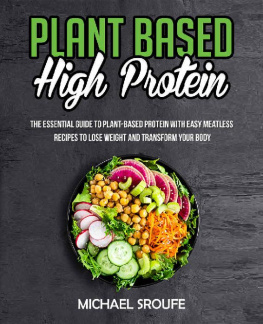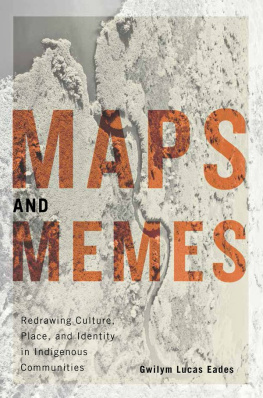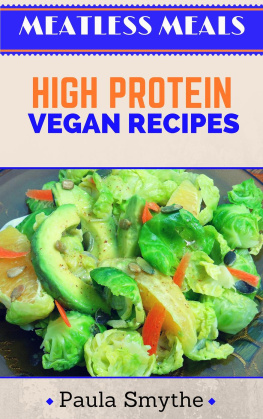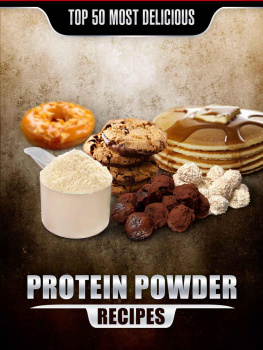Michael R. Eades - Protein Power
Here you can read online Michael R. Eades - Protein Power full text of the book (entire story) in english for free. Download pdf and epub, get meaning, cover and reviews about this ebook. year: 1996, publisher: Bantam Books, genre: Romance novel. Description of the work, (preface) as well as reviews are available. Best literature library LitArk.com created for fans of good reading and offers a wide selection of genres:
Romance novel
Science fiction
Adventure
Detective
Science
History
Home and family
Prose
Art
Politics
Computer
Non-fiction
Religion
Business
Children
Humor
Choose a favorite category and find really read worthwhile books. Enjoy immersion in the world of imagination, feel the emotions of the characters or learn something new for yourself, make an fascinating discovery.

- Book:Protein Power
- Author:
- Publisher:Bantam Books
- Genre:
- Year:1996
- Rating:4 / 5
- Favourites:Add to favourites
- Your mark:
- 80
- 1
- 2
- 3
- 4
- 5
Protein Power: summary, description and annotation
We offer to read an annotation, description, summary or preface (depends on what the author of the book "Protein Power" wrote himself). If you haven't found the necessary information about the book — write in the comments, we will try to find it.
Protein Power — read online for free the complete book (whole text) full work
Below is the text of the book, divided by pages. System saving the place of the last page read, allows you to conveniently read the book "Protein Power" online for free, without having to search again every time where you left off. Put a bookmark, and you can go to the page where you finished reading at any time.
Font size:
Interval:
Bookmark:
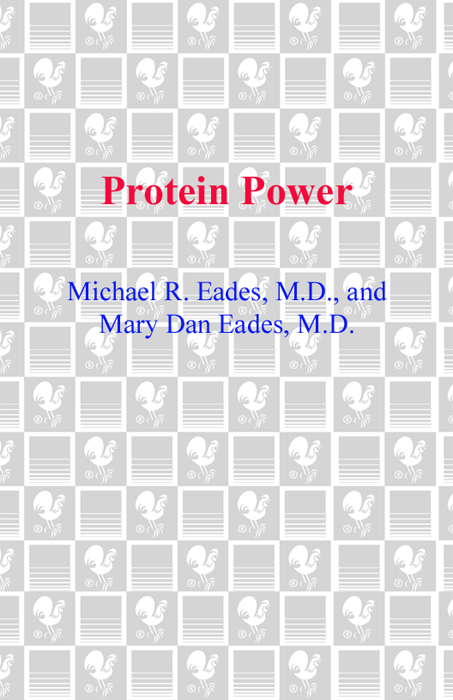
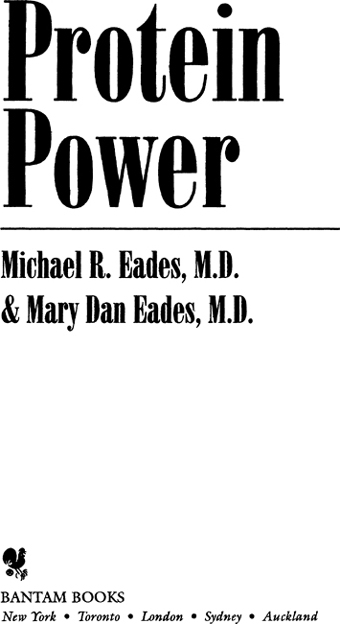
Succeeds where low-fat diets fail you
complete, satisfying meal plans, suitable for family dinners or formal entertaining
a Daily Meal Outline to keep track of your food selections
ways to modify the foods you love the most to make them fit your diet plan
tips on making the best selections at fine restaurants or fast-food chains
a minicookbook filled with nearly 100 easy-to-prepare, inexpensive, and mouthwatering recipes, from Tex-Mex Cheese Flan with Chunky Salsa and Coconut Salmon to Irish Lace Cookies and Chocolate Chip Cheesecake
supplements that will jump-start your metabolism to burn fat
ways to include wine in your diet for enjoyment and health
an invaluable program of strength-building exercises
tips for maintaining motivation
and more
BY THE SAME AUTHORS
M ICHAEL R. E ADES, M.D.
Thin So Fast
M ARY D AN E ADES, M.D.
If It Runs in Your Family: Breast Cancer
If It Runs in Your Family: Arthritis
Freeing Someone You Love from Eating Disorders
The Doctors Complete Guide to Vitamins and Minerals
To British physician John Yudkin, M.D., Ph.D., who was fighting the good fight before we were born.
And to our sons, Ted, Daniel, and Scott Eades, who will continue to fight it after were gone.
There was an old man of Tobago,
Who lived on rice, gruel, and sago;
Till, much to his bliss,
His physician said this
To a leg, sir, of mutton you may go.
J OHN M ARSHALL, 1822
PART I:
Chapter 1
Chapter 2
Chapter 3
Chapter 4
PART II:
Chapter 5
Chapter 6
Chapter 7
Chapter 8
Chapter 9
Chapter 10
PART III:
Chapter 11
Chapter 12
Chapter 13
We would like to thank the many people who were instrumental in helping us bring this book to you. Its been a long and sometimes difficult process through which we had the unfailing support of our agent and friend Channa Taub, who consoled and cajoled us through some stressful times and was always willing to sharpen her editorial pencil when needed. Channa brought us to Carol Mann, who gets many thanks for bringing our work to the wonderful group at Bantam Books. Thanks to Fran McCullough, our editor, for her interest in and understanding of this project and for all the work she did to streamline and improve the manuscript. And to everyone at Bantamespecially Irwyn Applebaum, Nita Taublib, Allen Goodman, Amanda Mecke, Barb Burg, and Lauren Janis.
To our sons, Ted, Dan, and Scott, who put up with erratic family schedules and cranky parents during the writing of this book, we love you.
Our faithful staff at the clinic, who fielded calls, juggled schedules, and held down the fort while we wrote, deserve special mentionthanks to Rhonda Mallison, Mary Clendaniel, Linda Tullos, Valerie Wilkins, Michelle Denton, and Deya Devorak.
Thanks to Barbara Witt, who contributed most of the recipes.
We are grateful for the support, help, criticism, and advice from our many professional and scientific colleagues who read and commented on this manuscript during its writing. Special thanks to Barry Sears, Ph.D., who has helped us refine our thinking by engaging us in hundreds of hours of how-many-angels-can-dance-on-the-head-of-a-pin-type arguments on the merits of our respective dietary philosophies. And to Allen Hill, M.D., whose suggestions and support have been invaluable, we give heartfelt thanks. Not only has he taken much time from his busy practice to read and help improve our manuscript, he has also graciously taken over the care of our patients innumerable times, often at a moments notice, during the many absences this project required of us.
And finally, thanks to Cathy Hemming, our erstwhile agent and always our friend, who believed in the merits of this book and this paradigm before anyone else.
You may be wondering how a couple of physicians who specialize in weight loss in a relatively small city in Middle America devised a nutritional program that works as well as this one does, while most of the scientists in the major universities are headed off in the opposite direction, puzzling over why their success with low-fat diet plans has been so minimal. In a nutshell, we lucked out. We lucked out because thats how science works. Science progresses because people continue to question why. Researchers propose hypotheses based on their understanding of the natural world and then test themand most of the time these theories blow up in their faces. The lucky ones stumble onto the hypotheses that turn out to be valid. But of course theres more than luck involved, because as Louis Pasteur said, Chance favors the prepared mind, and in our case our minds were prepared by many years of clinical practice with patients suffering all the illnesses that are heir to disordered insulin metabolism as well as by our unique combination of medical interests. Mike is a collector of diet books and old medical texts and has a strong interest in paleopathology and biochemistry; Mary Dan is interested in anthropology and has published a book on eating disorders and the deranged metabolic status of eating-disordered patients.
We have a copy of the earliest diet book ever to sweep the nation, Bantings Letter on Corpulence, first printed in the middle 1800s. This restricted-carbohydrate diet worked like a charm for Banting and, if sales were any in duration, many others. It has always intrigued us because it completely flies in the face of todays low-fat paradigm. At about the same time we ran across Banting we began attending paleopathology conferences and studying anthropology, where we learned what paleopathologists and anthropologists have known for years: the agricultural revolution and the increased consumption of carbohydrates it brought along with it played havoc with the health of early man. Mary Dans extensive study of eating disorders and metabolic hormonal derangements combined with Mikes interest in biochemistry rounded out the preparation of our minds. We looked at Bantings success with carbohydrate restriction along with the paleopathological/anthropological data showing a decline in health accompanying an increase in carbohydrate intake and concluded that maybe the intake of large amounts of carbohydrates wasnt necessarily a good thing. That became our first mini-hypothesis: excess carbohydrate consumption isnt good. But why not?
We knew, as does every doctor, that the immediate effect of carbohydrate consumption is increased blood glucose, then an increased insulin level. We thought that perhaps the increased insulin levels might be to blame for part of the problem. As we studied the medical literature, we found that researchers the world over were finding elevated insulin levels associated with obesity, heart disease, high blood pressure, and diabetesthe common diseases of modern man. We also found that the same researchers were for the most part trying to treat these patients by giving them more of the same thing we were beginning to believe may have caused the problem in the first place: the high-carbohydrate, low-fat diet. It made more sense to us that if excess insulin indeed
Font size:
Interval:
Bookmark:
Similar books «Protein Power»
Look at similar books to Protein Power. We have selected literature similar in name and meaning in the hope of providing readers with more options to find new, interesting, not yet read works.
Discussion, reviews of the book Protein Power and just readers' own opinions. Leave your comments, write what you think about the work, its meaning or the main characters. Specify what exactly you liked and what you didn't like, and why you think so.

